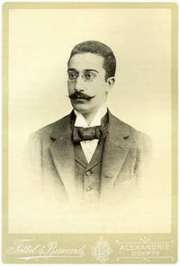|
Biografie Constantinos Kavafis
Constantine P. Cavafy, also known as Konstantin or Konstantinos Petrou Kavafis, or Kavaphes (Greek Êùíóôáíôßíïò Ð. ÊáâÜöçò) (April 29, 1863–April 29,1933) was a renowned modern Greek poet who lived in Alexandria and worked as a journalist and civil servant. In his poetry he examines critically some aspects of Christianity, patriotism, and homosexuality, though he was not always comfortable with his role as a nonconformist. He published 154 poems; dozens more remained incomplete or in sketch form. His most important poetry was written after his fortieth birthday.
Cavafy was born in 1863 in Alexandria, Egypt, to Greek parents, and was baptized into the Greek Orthodox Church. His father was a prosperous importer-exporter who had lived in England in earlier years and acquired British nationality. After his father died in 1870, Cavafy and his family settled, for a while in Liverpool in England. In 1876, his family faced financial problems following the crash, so, by 1877, he had to move back to Alexandria.
In 1882, disturbances in Alexandria caused the family to move again, though, temporarily, to Constantinople. This was the year when a revolt broke out in Alexandria against the Anglo-French control of Egypt, thus precipating the 1882 Anglo-Egyptian War; Alexandria was bombarded by a British fleet and the family apartment at Ramli was burned. In 1885, Cavafy returned to Alexandria, where he lived for the rest of his life. His first work was as a journalist; then he took up position with the British-run Egyptian Ministry of Public Works for thirty years. (Egypt was a British protectorate until 1926.) He published his poetry from 1891 to 1904 in the form of broadsheets, and this only for his close friends. Any acclaim he was to receive came mainly from within the Greek community of Alexandria. Eventually, in 1903, he was introduced to mainland-Greek literary circles through a favourable review by Xenopoulos, but with little recognition since his style was very different from the then-mainstream Greek poetry. It was only 20 years later, after the Greek defeat in the Greco-Turkish War (1919-1922), that a new generation of almost nihilist poets (e.g. Karyotakis) would find inspiration in Cavafy's work.
Cavafy has been instrumental in the revival and recognition of Greek poetry both at home and abroad. His poems are, typically, concise but intimate evocations of real or literary figures and milieux that have played a role in Greek culture. Uncertainty about the future, sensual pleasures, the moral character and psychology of individuals, homosexuality, and a fatalistic existential nostalgia are some of the defining themes.
Besides his subjects, unconventional for the time, his poems also exhibit a skilled and versatile craftsmanship, which is almost completely lost in translation. Cavafy was a perfectionist, obsessively refining every single line of his poetry. His mature style was a free iambic form, free in the sense that verses rarely rhyme and are usually from 10 to 17 syllables. In his poems, the presence of rhyme usually implies irony.
Cavafy drew his themes from personal experience, along with an enormous knowledge of history, especially of the Hellenistic era. Many of his poems are either pseudo-historical, or seemingly historical, or accurately, but quirkily, historical.
One of Cavafy's most important works is his 1904 poem "Waiting for the Barbarians". This work, in the person of a disingenuous Byzantine narrator, cynically explores the view that cultivating fear of an invisible external enemy usually serves internal purposes. Parallels have been drawn between the poem's message and the war on terror.[2] In 1911, he wrote Ithaca, inspired by the Homeric return journey of Odysseus to his home island, as depicted in the Odyssey. The poem's theme is that the enjoyment of the journey of life, and the increasing maturity of the soul as that journey continues, is all the traveler can ask.
|




